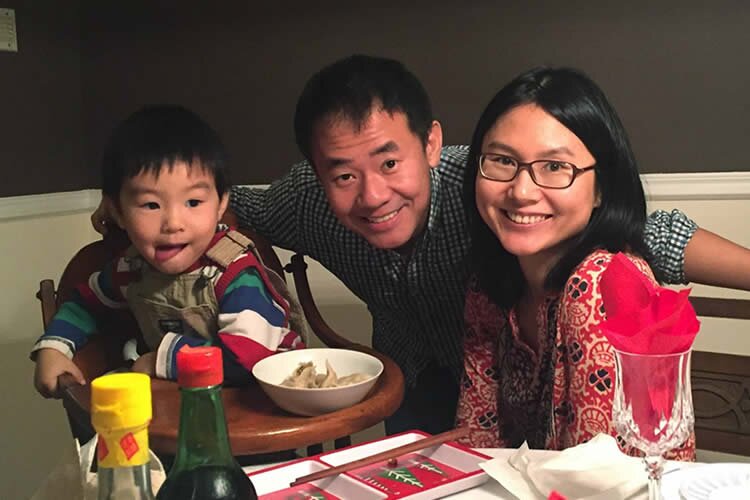January 22, 2021

Xiyue Wang, the Chinese-American dual citizen freed by Iran one year ago, says trying to moderate the Islamic Republic is a fool’s errand because the regime there needs to maintain hostility to the United States to justify its existence and its harsh domestic policies.
Wang was held prisoner for a little more than three years before being exchanged and freed last December.
He has since written an article for Foreign Affairs magazine in which he says his support for a moderate policy of negotiations with Iran changed drastically as a result of his experiences in Iran and discussions he had with fellow prisoners, especially those who had worked for the regime.
He concluded: “American policymakers and the public should understand that at the heart of Iran’s problematic relationship with the United States lies the following fact: the theocracy’s survival and its elite’s prosperity require maintaining hostility against the United States.”
Wang, 40, was born in Beijing in 1980 and immigrated to the United States with his mother, an American citizen, in 2001. He became a naturalized US citizen in 2009. His wife and child are Chinese citizens.
He writes, “My view of the relationship between the United States and Iran, and of the nature of the Iranian regime, would gradually change over the course of my 40 months in Tehran’s notorious Evin Prison. There I witnessed the regime’s actual workings from the inside, and I learned a great deal from interacting with other prisoners—Iranian men from all walks of life, many of whom had previously worked for the regime.
“My comment—that President Obama ought to visit Iran in an effort to normalize relations—was later used as evidence against me in a year-long farcical legal process. I was accused of attempting ‘soft subversion’ and ‘infiltration,’ with the aim of toppling the Iranian regime. As ridiculous as it might seem, the Iranian regime uses such rhetoric not only to convict and sentence innocent Americans, who are mostly used as hostages to extract concessions from the US government, but also to express a principal ideological preoccupation of the regime: reconciliation with the United States is threatening and unacceptable, and all attempts at rapprochement must be suppressed.”
Wang said, “Anti-Americanism lies at the core of the Islamic Republic’s state ideology, which casts Iran as the defender of Muslims against an expansionist, imperial United States. Iran has no interest in reconciling or normalizing relations with the United States, because doing so would invalidate the revolutionary regime’s raison d’etre. At a more practical and opportunistic level, the rhetoric about the threat and menace of an unrelenting foreign foe justifies the regime’s domestic repression and its efforts to expand its influence throughout the Middle East and beyond.
“The need to maintain hostility against the United States, regardless of the US policy orientation toward Iran, is widely acknowledged among Iranian officials. A prisoner who had worked in a high government office told me that Saeed Jalili, the former secretary of Iran’s Supreme National Security Council [under President Mahmud Ahmadi-nejad], had commented that the regime does not want any reconciliation with the United States because it would undermine the regime’s legitimacy; instead, the regime wanted to maintain a manageable state of tension with the United States in order to justify its domestic and foreign policies.”
Wang continued, “Regime loyalists exploit the hostility against the United States for personal and institutional gains, and in so doing, they reinforce the enmity. My interrogator told me toward the end of my interrogation process that I must confess to being a US spy, even though he knew I was not one. This confession was necessary, he said, so that the Iranian intelligence services could create a case against me and demand monetary payment and a prisoner exchange from the United States. I was shocked by the interrogator’s candor and utter cynicism.”
Wang said, “The Iranian regime, as I saw it, was deeply ambivalent about the nuclear deal. It was eager to benefit financially, but the IRGC in particular feared that the deal might lead to demands for political and economic liberalization that would be detrimental to the regime’s interests. In fact, the Iranian regime and its hardline supporters saw the efflorescence of economic activities in Iran because of the deal as a threat, and they worried that a burgeoning private sector would strengthen the society at the expense of the state. For this reason, they hastened to stifle the private sector, especially the tech industry.”
On August 7, 2016, Wang, a fourth-year graduate student at Princeton University, was detained and confined to Evin Prison. His academic field is late 19th and early 20th century Eurasian history. His dissertation analyzes regional governance practices across multiple countries during that time period. In Iran, he was interested in studying the administrative and cultural history of the Qajar Dynasty, which ruled from 1789 to 1925. In February 2017, Wang was charged with two counts of espionage. Two months later, he was convicted and sentenced to 10 years imprisonment. The appeal of his sentence was denied.
Wang was freed December 7, 2019. In exchange for Wang, the United States freed Masoud Soleimani, an Iranian scientist who had been arrested at Chicago’s airport in 2018 and convicted of violating American trade sanctions on Iran. American officials said Soleimani’s release was a low price to pay for Wang’s freedom because Soleimani was expected to be released from prison the next month anyhow under a plea agreement.